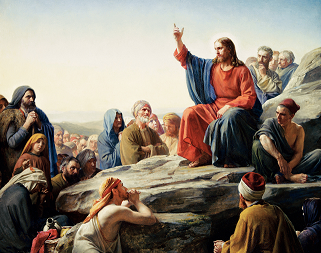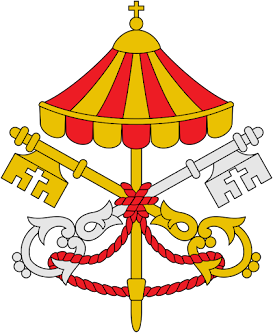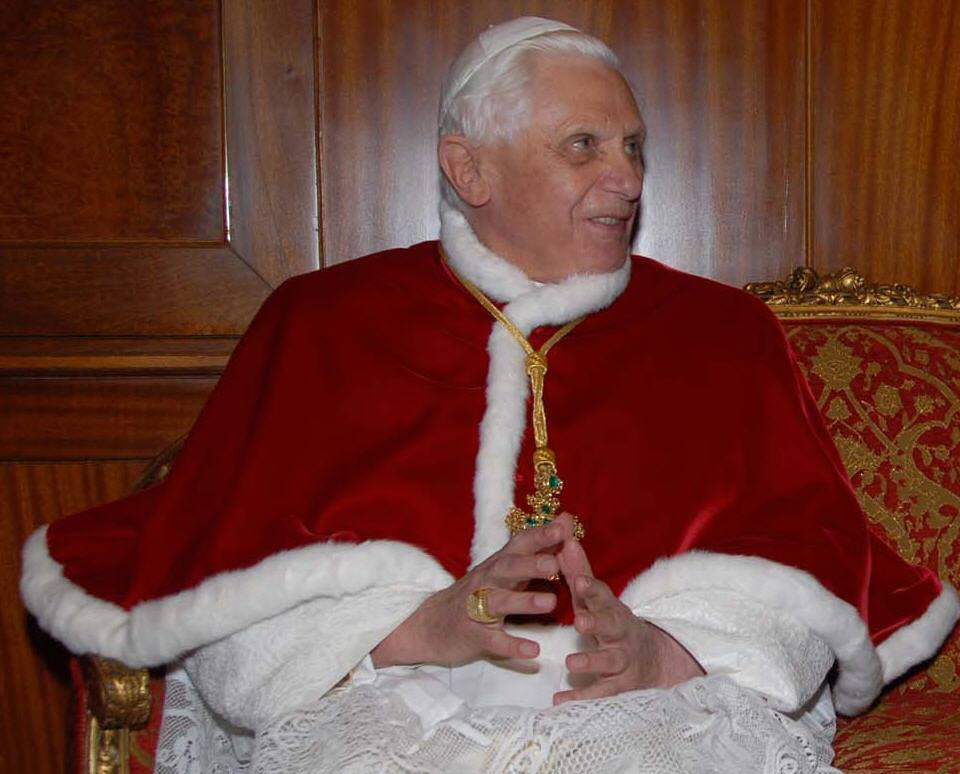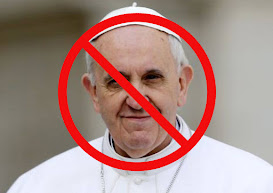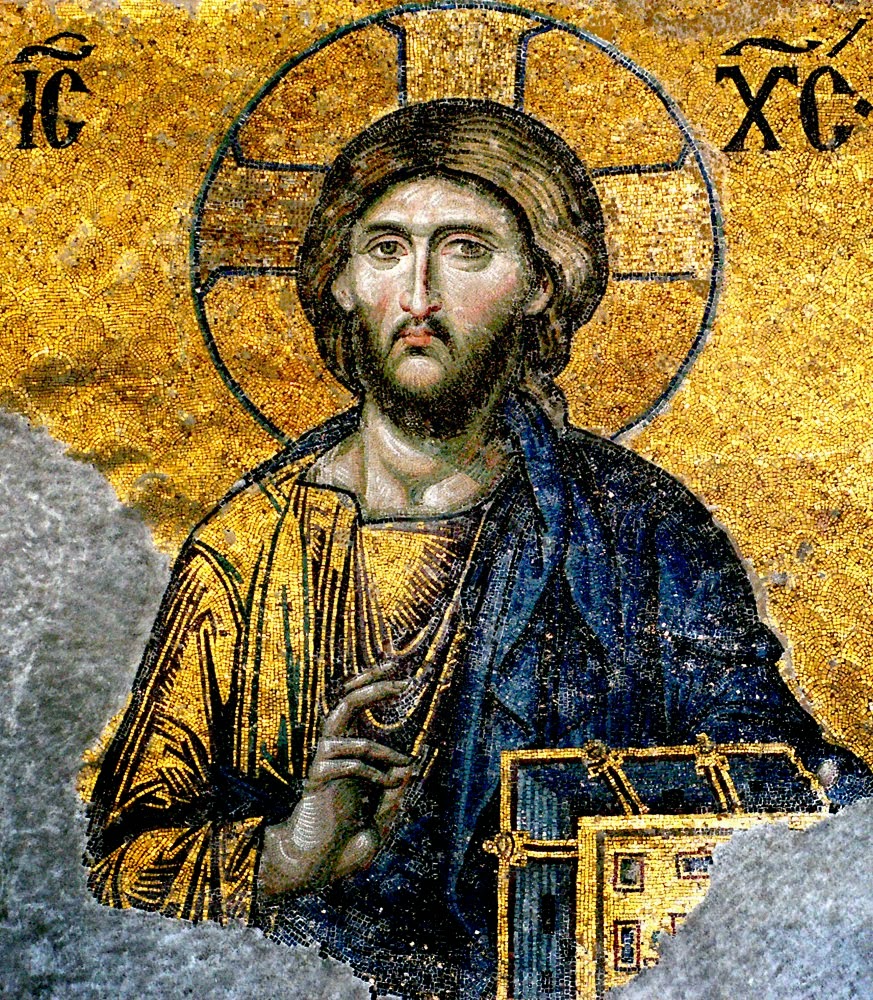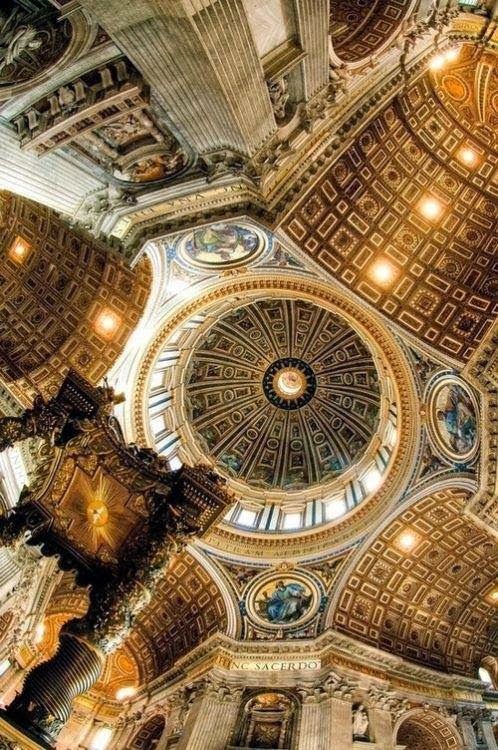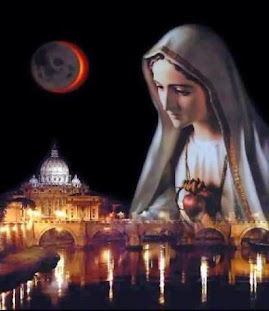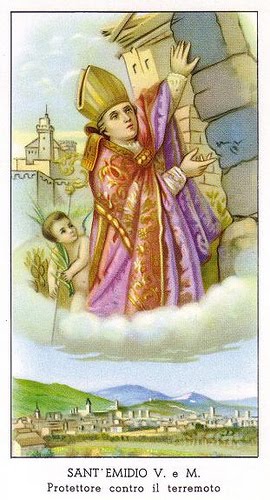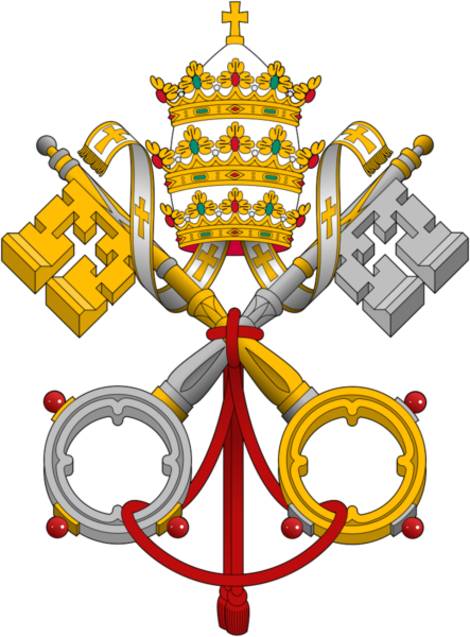
dinsdag 21 september 2010
zondag 19 september 2010
Toespraak van Paus Benedictus XVI in Oscott College - Birmingham
MEETING WITH THE BISHOPS OF ENGLAND,
SCOTLAND AND WALES
ADDRESS OF HIS HOLINESS BENEDICT XVI
Chapel of the Francis Martin House, Oscott College - Birmingham
Sunday, 19 September 2010
My dear Brother Bishops,
This has been a day of great joy for the Catholic community in these islands. Blessed John Henry Newman, as we may now call him, has been raised to the altars as an example of heroic faithfulness to the Gospel and an intercessor for the Church in this land that he loved and served so well. Here in this very chapel in 1852, he gave voice to the new confidence and vitality of the Catholic community in England and Wales after the restoration of the hierarchy, and his words could be applied equally to Scotland a quarter of a century later. His beatification today is a reminder of the Holy Spirit’s continuing action in calling forth gifts of holiness from among the people of Great Britain, so that from east to west and from north to south, a perfect offering of praise and thanksgiving may be made to the glory of God’s name.
I thank Cardinal O’Brien and Archbishop Nichols for their words, and in so doing, I am reminded how recently I was able to welcome all of you to Rome for the Ad Limina visits of your respective Episcopal Conferences. We spoke then about some of the challenges you face as you lead your people in faith, particularly regarding the urgent need to proclaim the Gospel afresh in a highly secularized environment. In the course of my visit it has become clear to me how deep a thirst there is among the British people for the Good News of Jesus Christ. You have been chosen by God to offer them the living water of the Gospel, encouraging them to place their hopes, not in the vain enticements of this world, but in the firm assurances of the next. As you proclaim the coming of the Kingdom, with its promise of hope for the poor and the needy, the sick and the elderly, the unborn and the neglected, be sure to present in its fulness the life-giving message of the Gospel, including those elements which call into question the widespread assumptions of today’s culture. As you know, a Pontifical Council has recently been established for the New Evangelization of countries of long-standing Christian tradition, and I would encourage you to avail yourselves of its services in addressing the task before you. Moreover, many of the new ecclesial movements have a particular charism for evangelization, and I know that you will continue to explore appropriate and effective ways of involving them in the mission of the Church.
Since your visit to Rome, political changes in the United Kingdom have focused attention on the consequences of the financial crisis, which has caused so much hardship to countless individuals and families. The spectre of unemployment is casting its shadow over many people’s lives, and the long-term cost of the ill-advised investment practices of recent times is becoming all too evident. In these circumstances, there will be additional calls on the characteristic generosity of British Catholics, and I know that you will take a lead in calling for solidarity with those in need. The prophetic voice of Christians has an important role in highlighting the needs of the poor and disadvantaged, who can so easily be overlooked in the allocation of limited resources. In their teaching document Choosing the Common Good, the Bishops of England and Wales underlined the importance of the practice of virtue in public life. Today’s circumstances provide a good opportunity to reinforce that message, and indeed to encourage people to aspire to higher moral values in every area of their lives, against a background of growing cynicism regarding even the possibility of virtuous living.
Another matter which has received much attention in recent months, and which seriously undermines the moral credibility of Church leaders, is the shameful abuse of children and young people by priests and religious. I have spoken on many occasions of the deep wounds that such behaviour causes, in the victims first and foremost, but also in the relationships of trust that should exist between priests and people, between priests and their bishops, and between the Church authorities and the public. I know that you have taken serious steps to remedy this situation, to ensure that children are effectively protected from harm and to deal properly and transparently with allegations as they arise. You have publicly acknowledged your deep regret over what has happened, and the often inadequate ways it was addressed in the past. Your growing awareness of the extent of child abuse in society, its devastating effects, and the need to provide proper victim support should serve as an incentive to share the lessons you have learned with the wider community. Indeed, what better way could there be of making reparation for these sins than by reaching out, in a humble spirit of compassion, towards children who continue to suffer abuse elsewhere? Our duty of care towards the young demands nothing less.
As we reflect on the human frailty that these tragic events so starkly reveal, we are reminded that, if we are to be effective Christian leaders, we must live lives of the utmost integrity, humility and holiness. As Blessed John Henry Newman once wrote, “O that God would grant the clergy to feel their weakness as sinful men, and the people to sympathize with them and love them and pray for their increase in all good gifts of grace” (Sermon, 22 March 1829). I pray that among the graces of this visit will be a renewed dedication on the part of Christian leaders to the prophetic vocation they have received, and a new appreciation on the part of the people for the great gift of the ordained ministry. Prayer for vocations will then arise spontaneously, and we may be confident that the Lord will respond by sending labourers to bring in the plentiful harvest that he has prepared throughout the United Kingdom (cf. Mt 9:37-38). In this regard, I am glad that I will shortly have the opportunity to meet the seminarians of England, Scotland and Wales, and to assure them of my prayers as they prepare to play their part in bringing in that harvest.
Finally, I should like to speak to you about two specific matters that affect your episcopal ministry at this time. One is the imminent publication of the new translation of the Roman Missal. I want to take this opportunity to thank all of you for the contribution you have made, with such painstaking care, to the collegial exercise of reviewing and approving the texts. This has provided an immense service to Catholics throughout the English-speaking world. I encourage you now to seize the opportunity that the new translation offers for in-depth catechesis on the Eucharist and renewed devotion in the manner of its celebration. “The more lively the eucharistic faith of the people of God, the deeper is its sharing in ecclesial life in steadfast commitment to the mission entrusted by Christ to his disciples” (Sacramentum Caritatis, 6). The other matter I touched upon in February with the Bishops of England and Wales, when I asked you to be generous in implementing the Apostolic Constitution Anglicanorum Coetibus. This should be seen as a prophetic gesture that can contribute positively to the developing relations between Anglicans and Catholics. It helps us to set our sights on the ultimate goal of all ecumenical activity: the restoration of full ecclesial communion in the context of which the mutual exchange of gifts from our respective spiritual patrimonies serves as an enrichment to us all. Let us continue to pray and work unceasingly in order to hasten the joyful day when that goal can be accomplished.
With these sentiments, I thank you warmly for your hospitality over the past four days. Commending all of you and the people you serve to the intercession of Saint Andrew, Saint David and Saint George, I am pleased to impart my Apostolic Blessing to you and to all the clergy, religious and lay faithful of England, Scotland and Wales.

Vandaag: Onze-Lieve-Vrouw van La Salette




Onze-Lieve-Vrouw van La Salette, middelares voor de zondaars genoemd, betreft een bedevaartsoord in La Salette, een klein Alpendorpje op 1.800 meter hoogte in de gemeente La Salette-Fallavaux, in het Franse Dauphine in het bisdom Grenoble, ca. 75 km ten zuidoosten van Grenoble.
In het jaar 1846 heeft er in La Salette een verschijning van Maria aan twee herderskinderen, Melanie Calvat en Maximin Giraud, plaatsgevonden, welke door de Katholieke Kerk wordt erkend.
De congregatie van de Salettijnen dankt haar naam aan Onze-Lieve-Vrouw van La Salette.
Zaligverklaring van Kardinaal John Henry Newman

John Henry Newman (Londen, 21 februari 1801 - Birmingham, 11 augustus 1890) was een Engelse theoloog en bekeerling tot het Katholieke geloof. In 1879 werd hij door Paus Leo XIII kardinaal gecreëerd. Hij koos als wapenspreuk: Cor ad cor loquitur (Het hart spreekt tot het hart). Hij werd niet tot bisschop gewijd.
Newman studeerde aan Oriel College en Trinity College te Oxford en werd er professor. In zijn jonge jaren was hij een belangrijke figuur binnen de Oxford beweging die ernaar streefde om de Anglicaanse Kerk dichter bij haar Katholieke wortels te brengen. In 1845 trad hij toe tot de Rooms-Katholieke Kerk.
Hij werd tot priester gewijd en trad toe tot de gemeenschap van de Oratorianen. Zowel vóór als na zijn bekering schreef hij een aantal invloedrijke boeken, waaronder Via Media, Poging tot het ontwikkelen van een christelijke leer, An Idea of a University en de Grammar of Assent.
Zondag, 19 september 2010 werd Kardinaal Newman door Paus Benedictus XVI in Cofton Park, Birmingham, zalig verklaard.
zaterdag 18 september 2010
The Pope in Parliament and Westminster Abbey: a day that shook the foundations of Britain's 'Protestant Myth'!

How odd that it should be the Guardian that grasped the magnitude of what happened yesterday. Andrew Brown, religion editor of Comment is Free, and the possessor of an intellect as mighty and muddled as that of Rowan Williams, writes:
This was the end of the British Empire.
In all the four centuries from Elizabeth I to Elizabeth II, England has been defined as a Protestant nation. The Catholics were the Other; sometimes "violent terrorists and rebels", sometimes merely "dirty immigrants". The sense that this was a nation specially blessed by God arose from a deeply anti-Catholic reading of the Bible. Yet it was central to English self-understanding when Queen Elizabeth II was crowned in 1952 [sic], and swore to uphold the Protestant religion by law established.
For all of those 400 or so years it would have been unthinkable that a pope should stand in Westminster Hall and praise Sir Thomas More, who died to defend the pope’s sovereignty against the king’s. Rebellion against the pope was the foundational act of English power. And now the power is gone, and perhaps the rebellion has gone, too.
This was indeed a day of unthinkable events. Many Protestants will have been disturbed to see Pope Benedict XVI in Westminster Hall praising St Thomas More (who incidentally died to defend what he saw as the sovereignty of God). I don’t agree, however, that rebellion against the Pope was the “foundational act of English power”. Brown is a Left-wing agnostic whom one would expect to be suspicious of a national myth; but here we go again – we’re told that England discovered its identity as a result of the Reformation. Actually, English industry and culture flourished under the spiritual patronage of Rome; if the country had remained Catholic, they would have continued to do so. (In Germany, cities that remained Catholic were as prosperous as those that become Protestant.)
Indeed, if you want evidence of the self-confidence of our Catholic national identity, look no further than Westminster Abbey and Westminster Hall. For at least the first 500 years of its existence – we can’t be sure when it was founded – the Abbey was obedient to Benedict’s predecessors. So for the Pope to enter it today was an affirmation of its own “foundational act”. Not for nothing did he point out in his address that the church was dedicated to St Peter. Even Catholics who would never be so crude as to say “the Abbey belongs to us, not to you” sensed that history was being re-balanced in some way. They realised that the Pope had as much right to sit in that sanctuary as the Archbishop of Canterbury (who, to be fair, showed the Holy Father a degree of respect that implied that he, at least, recognises the spiritual primacy of the See of Peter even if he rejects some of its teachings).
Of course I’m not denying that for centuries anti-Catholicism was central to English self-understanding, even if it took nearly a century of harrassment and persecution to suppress the old religion. And there are still pockets of intense hatred of Rome in English society today. The difference is that the only anti-Catholics with influence are secularists who aren’t interested enough in the papal claims even to find out what they are. (I’m thinking of Peter Tatchell’s amazingly ignorant Channel 4 documentary.) They hate religion and they pick on Catholics because they’re the softest target. Protestant anti-Catholics, in contrast, don’t have mates in the media or useful allies in the Church of England. All they can do is watch in horror as the Pope of Rome processes into the church where Protestant monarchs are crowned, declares unambigously that he is the successor of St Peter with responsibility for the unity of Christendom, and then walks out again – to hearty applause.
To be honest, I’m still not quite sure what to make of it all myself. Benedict XVI’s speeches are worth reading several times; they often turn out to be more radical than they first appear. But one thing is for sure. Despite the unassuming courtesy of the Pope’s manner, he didn’t give an inch.
By Damian Thompson, who is Editor of Telegraph Blogs and a journalist specialising in religion.
dinsdag 14 september 2010
Requiem voor Professor Dr. Karel van Isacker S.J.
Het Plechtige Requiem vond plaats op dinsdag, 14 september 2010 om 19.00 uur in de Sint-Michaëlskapel te Niel-bij-As.
In paradisum deducant te angeli
Professor Dr. Karel van Isacker S.J.
* 26 juni 1913
+ 25 augustus 2010
In de kapel vond de plechtige Requiemmis plaats met assistentie van diaken en subdiaken en werd opgedragen volgens de buitengewone vorm van de Romeinse ritus (Tridentijns).
De Gregoriaanse gezangen werden verzorgd door de Schola Cantorum uit Achel.
Twee citaten uit het boekje 'Ontwijding' door pater Karel Van Isacker (Davidsfonds, 1989):
"Voor het weervinden van het geloof en de wijding zal er meer nodig zijn dan een terugkeer tot de authentieke teksten van Vaticanum II. Even onontbeerlijk is het goedmaken van de fouten: het overhoophalen van de traditie en het naïeve openstaan voor de 'wereld'."
"Wat na Vaticanum II in de Kerk gebeurde is heel wat anders dan het opruimen van verstarde gebruiken. Het is, op vele punten, een ruptuur met de heilige en daarom onaanraakbare oorsprong, met de Christus Die voortleeft in de Kerk. Het snelle verval van de godsdienstigheid is een symptoom. (...) De hoofdtrend van het proces van secularisering is duidelijk: emancipatie door desacralisatie. De mens moest autonoom worden en dus bevrijd van de religieuze tradities, van de wijding, van het sacrale dat hem opende voor 'het totaal ondere, het transcedente, het absolute, het goddelijke'. Zo werd ieder afbreken van een stuk eerbiedwaardig verleden een stap naar emanciperende ontwijding."
In paradisum deducant te angeli
Professor Dr. Karel van Isacker S.J.
* 26 juni 1913
+ 25 augustus 2010
In de kapel vond de plechtige Requiemmis plaats met assistentie van diaken en subdiaken en werd opgedragen volgens de buitengewone vorm van de Romeinse ritus (Tridentijns).
De Gregoriaanse gezangen werden verzorgd door de Schola Cantorum uit Achel.
Twee citaten uit het boekje 'Ontwijding' door pater Karel Van Isacker (Davidsfonds, 1989):
"Voor het weervinden van het geloof en de wijding zal er meer nodig zijn dan een terugkeer tot de authentieke teksten van Vaticanum II. Even onontbeerlijk is het goedmaken van de fouten: het overhoophalen van de traditie en het naïeve openstaan voor de 'wereld'."
"Wat na Vaticanum II in de Kerk gebeurde is heel wat anders dan het opruimen van verstarde gebruiken. Het is, op vele punten, een ruptuur met de heilige en daarom onaanraakbare oorsprong, met de Christus Die voortleeft in de Kerk. Het snelle verval van de godsdienstigheid is een symptoom. (...) De hoofdtrend van het proces van secularisering is duidelijk: emancipatie door desacralisatie. De mens moest autonoom worden en dus bevrijd van de religieuze tradities, van de wijding, van het sacrale dat hem opende voor 'het totaal ondere, het transcedente, het absolute, het goddelijke'. Zo werd ieder afbreken van een stuk eerbiedwaardig verleden een stap naar emanciperende ontwijding."
zondag 12 september 2010
Ode aan de Vreugde - Friedrich von Schiller
Vreugde, schone vonk door God geschonken,
Dochter uit Elysium,
Wij betreden vuurbedronken,
Hemelse, Uw heiligdom.
Uw betovering maakt weer één
Wat traditie streng had verdeeld;
Alle mensen worden broeders
Waar Uw zachte vleugel streelt.
Wees omvat, miljoenen zonen,
Deze kus aan de ganse Wereld!
Broeders, boven de sterrenhemel
Moet een lieve Vader wonen.
Wie het groot succes al inde,
Van een vriend de vriend te zijn,
Wie een lieve vrouw kon vinden
Dele met ons dit festijn!
Zelfs wie maar op heel de wereld
Aan één ziel zijn lot verbond!
Wenend weggaan moet degene
Die de boodschap nooit verstond!
Wie op aarde woont
Koester deze sympathie.
Die naar de sterren leidt,
Waar de Onbekende heerst.
Alle wezens drinken vreugde
Aan de borsten der natuur,
Alle goeden, alle slechten,
Volgen haar rozenspoor.
Kussen gaf zij ons en druiven,
En een vriend, beproefd in de dood.
Wellust werd aan de worm prijsgegeven,
En de Cherubijn staat voor God.
Jullie werpen je ter aarde, mensenzonen?
Kunnen jullie de Schepper voelen?
Zoek hem boven de sterrenhemel!
Boven de sterren moet Hij wonen!
Vreugde heet de veer
In de eeuwige natuur.
Vreugde, vreugde drijft de raderen
In de grote wereldhorloge
Bloemen lokt zij uit de knoppen,
Zonnen uit het firmament,
Sferen rolt zij in de ruimten
Die de telescoop niet kent.
Blij zoals Zijn zonnen vliegen
Door des hemels prachtig plan,
Loop ook, broeders, jullie baan,
Vreugdevol zoals een held ter zege.
Uit de vurige waarheidsspiegel
Lacht zij met de wetenschapper.
Naar de steile deugdenheuvel
Voert zij zacht wie lijden moet.
Op de zonneberg van het geloof,
Ziet men haar banieren wapperen,
Door de kier van gebarsten zerken
Haar in 't engelenkoor staan.
Doorsta toch moedig, mensenzonen!
Doorsta voor de betere wereld!
Boven, over het sterrenveld
Zal een grote God u lonen.
Goden kan men niets vergelden;
Mooi is aan hen gelijk te zijn.
Leed en armoe, kom jullie melden,
Met de blijden nu blij zijn.
Woede en wraak zij nu vergeten,
Onze aartsvijand vergeven.
Geen verdriet mag aan hem vreten,
En van rouw zij hij bevrijd.
Laat ons 't schuldenboek verscheuren!
Verzoend de hele wereld!
Broeders, boven de sterrenhemel
Berecht God ons, zoals wij berechten.
Vreugde sprankelt in bokalen;
Uit het gouden druivenbloed
Drinken kannibalen mildheid,
De vertwijfeling heldenmoed.
Broeders, vlieg op van uw plaatsen,
Geef de volle roemer door op 't feest,
Laat maar bruisen 't schuim ten hemel,
Dit glas aan de Goede Geest!
Hem die sterrenstelsels loven,
Hem die de Serafijn zingend prijst,
Dit glas aan de Goede Geest,
Boven het sterrendak daarboven!
Vaste moed in het lijden,
Hulp waar de Onschuld weent,
Eeuwigdurende gezworen eden,
Waarachtigheid tegenover vriend en vijand,
Mannentrots voor koningstronen
Broeders, al kost het goed en bloed
Wil verdienste kronen
En de ondergang aan het leugengebroed!
Sluit de heilige cirkel hechter,
Zweer bij deze gouden wijn
Uw gelofte trouw te zijn,
Zweer het bij de Sterrenrechter!
Redding van de ketenen des tirannen
Grootmoedigheid voor de bozewicht
Hoop op het sterfbed
Genade bij het Laatste Oordeel
Ook de doden zullen leven
Broeders drink en zing met ons mee
Alle zondaars worden hopelijk vergeven...
En de hel zal er dan niet meer zijn...
Een opgewekt afscheidsuur
Zoete slaap in de lijkwade
Broeders, een milde uitspraak
Uit de mond van de Dodenrechter
Dochter uit Elysium,
Wij betreden vuurbedronken,
Hemelse, Uw heiligdom.
Uw betovering maakt weer één
Wat traditie streng had verdeeld;
Alle mensen worden broeders
Waar Uw zachte vleugel streelt.
Wees omvat, miljoenen zonen,
Deze kus aan de ganse Wereld!
Broeders, boven de sterrenhemel
Moet een lieve Vader wonen.
Wie het groot succes al inde,
Van een vriend de vriend te zijn,
Wie een lieve vrouw kon vinden
Dele met ons dit festijn!
Zelfs wie maar op heel de wereld
Aan één ziel zijn lot verbond!
Wenend weggaan moet degene
Die de boodschap nooit verstond!
Wie op aarde woont
Koester deze sympathie.
Die naar de sterren leidt,
Waar de Onbekende heerst.
Alle wezens drinken vreugde
Aan de borsten der natuur,
Alle goeden, alle slechten,
Volgen haar rozenspoor.
Kussen gaf zij ons en druiven,
En een vriend, beproefd in de dood.
Wellust werd aan de worm prijsgegeven,
En de Cherubijn staat voor God.
Jullie werpen je ter aarde, mensenzonen?
Kunnen jullie de Schepper voelen?
Zoek hem boven de sterrenhemel!
Boven de sterren moet Hij wonen!
Vreugde heet de veer
In de eeuwige natuur.
Vreugde, vreugde drijft de raderen
In de grote wereldhorloge
Bloemen lokt zij uit de knoppen,
Zonnen uit het firmament,
Sferen rolt zij in de ruimten
Die de telescoop niet kent.
Blij zoals Zijn zonnen vliegen
Door des hemels prachtig plan,
Loop ook, broeders, jullie baan,
Vreugdevol zoals een held ter zege.
Uit de vurige waarheidsspiegel
Lacht zij met de wetenschapper.
Naar de steile deugdenheuvel
Voert zij zacht wie lijden moet.
Op de zonneberg van het geloof,
Ziet men haar banieren wapperen,
Door de kier van gebarsten zerken
Haar in 't engelenkoor staan.
Doorsta toch moedig, mensenzonen!
Doorsta voor de betere wereld!
Boven, over het sterrenveld
Zal een grote God u lonen.
Goden kan men niets vergelden;
Mooi is aan hen gelijk te zijn.
Leed en armoe, kom jullie melden,
Met de blijden nu blij zijn.
Woede en wraak zij nu vergeten,
Onze aartsvijand vergeven.
Geen verdriet mag aan hem vreten,
En van rouw zij hij bevrijd.
Laat ons 't schuldenboek verscheuren!
Verzoend de hele wereld!
Broeders, boven de sterrenhemel
Berecht God ons, zoals wij berechten.
Vreugde sprankelt in bokalen;
Uit het gouden druivenbloed
Drinken kannibalen mildheid,
De vertwijfeling heldenmoed.
Broeders, vlieg op van uw plaatsen,
Geef de volle roemer door op 't feest,
Laat maar bruisen 't schuim ten hemel,
Dit glas aan de Goede Geest!
Hem die sterrenstelsels loven,
Hem die de Serafijn zingend prijst,
Dit glas aan de Goede Geest,
Boven het sterrendak daarboven!
Vaste moed in het lijden,
Hulp waar de Onschuld weent,
Eeuwigdurende gezworen eden,
Waarachtigheid tegenover vriend en vijand,
Mannentrots voor koningstronen
Broeders, al kost het goed en bloed
Wil verdienste kronen
En de ondergang aan het leugengebroed!
Sluit de heilige cirkel hechter,
Zweer bij deze gouden wijn
Uw gelofte trouw te zijn,
Zweer het bij de Sterrenrechter!
Redding van de ketenen des tirannen
Grootmoedigheid voor de bozewicht
Hoop op het sterfbed
Genade bij het Laatste Oordeel
Ook de doden zullen leven
Broeders drink en zing met ons mee
Alle zondaars worden hopelijk vergeven...
En de hel zal er dan niet meer zijn...
Een opgewekt afscheidsuur
Zoete slaap in de lijkwade
Broeders, een milde uitspraak
Uit de mond van de Dodenrechter
Abonneren op:
Posts (Atom)
S.E. Mons. Mario OLIVERI - Vescovo emerito di Albenga-Imperia

We Stand In Support of Padre Stefano Manelli
Paus Benedictus XVI

Een meditatie over het Heilig Misoffer
2 Timoteüs 2:3 Neem ook uw aandeel in het lijden als een goed krijgsknecht van Christus Jezus
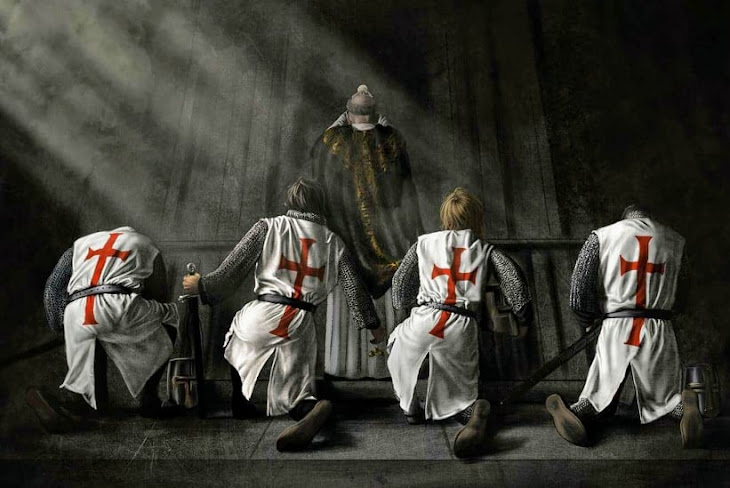
-------- “Wij zijn de zonen van de Kruisvaarders en we zullen niet terugdeinzen voor de zonen van Voltaire.” -------- -------- “We are the sons of the Crusaders and we shall not recoil before the sons of Voltaire.” ------------------------- -------- “Noi siamo i figli dei Crociati e non indietreggeremo davanti ai figli di Voltaire!” ---------------------------------













